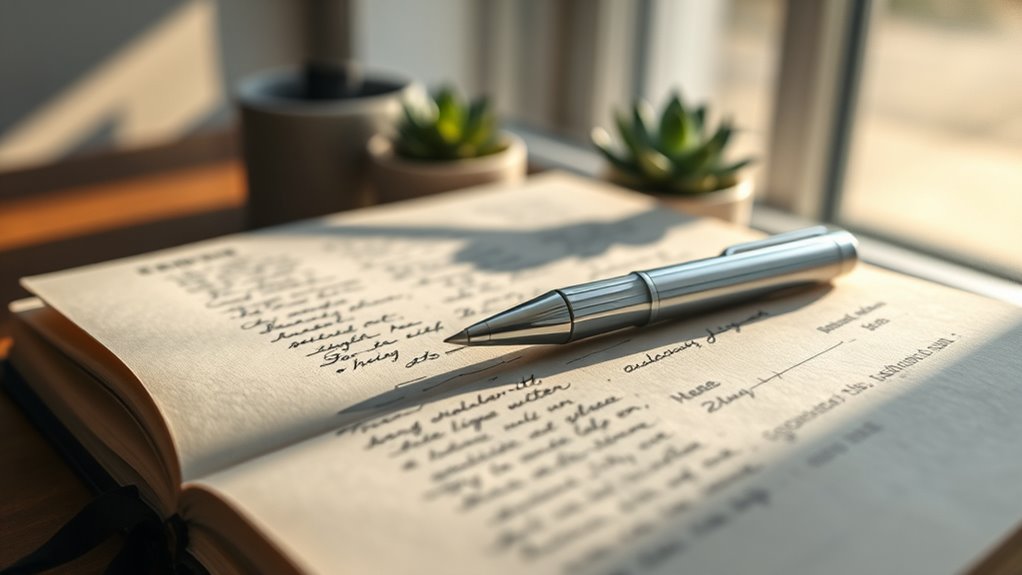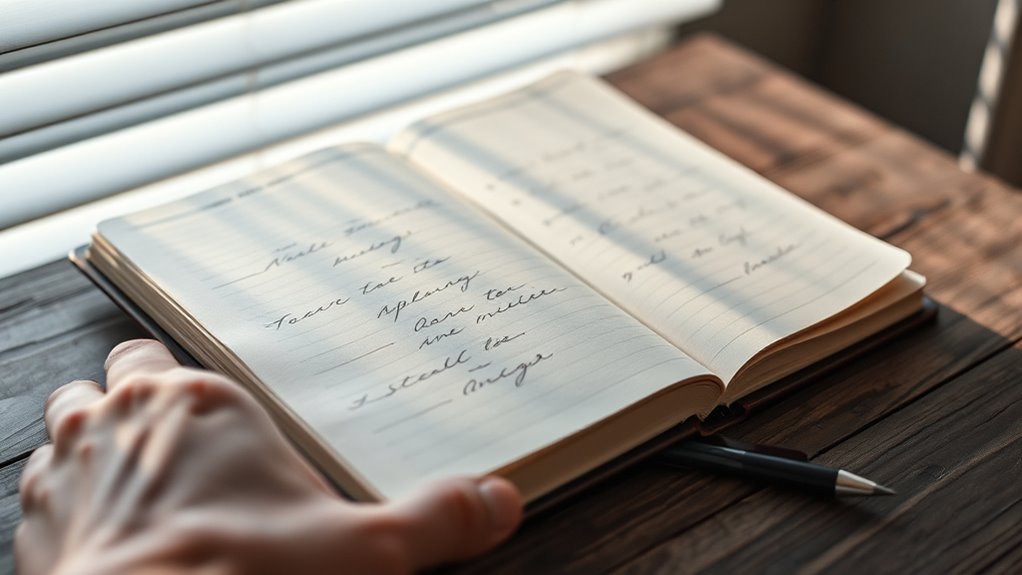Mindful journaling helps you cultivate awareness and emotional clarity by encouraging honest self-exploration on paper. When you write freely about your thoughts and feelings, you can better recognize patterns, triggers, and underlying causes of your emotions. This practice reduces stress, promotes calmness, and enhances insight into your emotional landscape. By regularly engaging in mindful journaling, you’ll develop a deeper understanding of yourself and learn how to respond more thoughtfully to life’s challenges—an approach worth exploring further.
Key Takeaways
- Mindful journaling promotes awareness by encouraging honest reflection on thoughts, feelings, and physical sensations without judgment.
- Regular practice helps identify emotional patterns and triggers, fostering greater clarity and insight.
- Writing serves as a tool for externalizing worries, reducing mental clutter, and cultivating a calmer, more centered mind.
- It enhances present-moment awareness by anchoring attention to current experiences and emotional responses.
- Consistent journaling deepens self-understanding, supporting emotional growth and stress management through mindful observation.

Mindful journaling offers a simple yet powerful way to cultivate greater awareness and clarity in your daily life. When you sit down to write with intention, you create a space to explore your thoughts and feelings without judgment. This practice helps you develop emotional clarity, allowing you to better understand what you’re experiencing internally. By putting your emotions on paper, you can identify patterns, triggers, and underlying causes that might otherwise stay hidden. As you clarify your feelings, you gain insight into your emotional landscape, making it easier to manage your reactions and navigate life’s ups and downs.
Writing with intention uncovers hidden patterns and deepens emotional understanding.
In addition, mindful journaling acts as a stress reduction tool. When you write about your worries, anxieties, or frustrations, you transfer those mental burdens onto paper, which often makes them feel less overwhelming. This act of externalizing your thoughts can provide immediate relief, helping you to feel calmer and more centered. Over time, this process trains your brain to approach stressors with greater detachment and perspective. Instead of ruminating endlessly over problems, you learn to observe your thoughts objectively, which diminishes their power over you. The physical act of writing also stimulates the parasympathetic nervous system, promoting relaxation and reducing cortisol levels, the hormone linked to stress.
To get started, find a quiet, comfortable space where you won’t be disturbed. Set an intention for your journaling session—perhaps to explore your emotions or simply to unload your worries. Begin by taking a few deep breaths, grounding yourself in the present moment. As you write, focus on honesty and openness; don’t censor yourself or worry about grammar or style. Let your thoughts flow freely onto the paper. If you notice your mind wandering, gently bring your attention back to your feelings or the current moment. Over time, you’ll notice patterns and insights emerging from your writing, which can guide your emotional growth and stress management strategies. Additionally, incorporating mindfulness can help you become more aware of your emotional landscape and how your thoughts influence your physical responses.
Consistent mindfulness in journaling deepens your self-awareness and emotional lucidity. It creates a ripple effect that improves your overall mental health, enabling you to respond rather than react to life’s challenges. The more you practice, the more natural it becomes to approach your feelings with curiosity and compassion. Ultimately, mindful journaling becomes a crucial tool, helping you stay rooted in the present, manage stress effectively, and cultivate a clearer understanding of your inner world.
Frequently Asked Questions
How Often Should I Journal for Mindfulness Benefits?
You should journal daily or at least several times a week for mindfulness benefits. Consistency tips include setting a specific time each day and keeping your journaling simple to build a habit. Regular journaling helps you stay aware of your thoughts and feelings, promoting mindfulness. Even 10-15 minutes per session can make a difference. The key is to make journaling part of your routine, so it becomes a natural, ongoing practice.
Can Mindful Journaling Replace Therapy or Counseling?
Mindful journaling can’t fully replace therapy or counseling because it offers limited therapeutic effectiveness. While it helps you process emotions and increase awareness, it doesn’t provide the professional guidance needed for complex issues. Use journaling as a complementary tool to support emotional processing, but for deeper concerns, seek qualified therapy or counseling. Combining both approaches guarantees a balanced, more effective path to mental well-being.
What Are Common Challenges Beginners Face in Mindful Journaling?
You might think overcoming self-criticism is tough, but don’t let it stop you. Beginners often struggle with establishing consistency, feeling discouraged if they miss days. The key is to start small and be gentle with yourself. Focus on progress, not perfection. Remember, regular journaling helps quiet inner critic and builds habits. Keep a flexible routine, and over time, you’ll find it easier to stay committed and gain awareness through your writing.
Is There a Best Time of Day to Journal Mindfully?
The ideal timing for mindful journaling varies, but many find morning reflection optimal. Starting your day with journaling helps set a calm, focused tone and increases awareness early on. However, you might also benefit from evening journaling to reflect on your day. Ultimately, find a time that fits your routine and allows you to be present, making it easier to cultivate mindfulness consistently.
How Can I Stay Motivated to Maintain a Journaling Routine?
You might think you’ll lose interest, but staying motivated is easier with habit formation and clear goal setting. Make journaling part of your daily routine by linking it to an existing habit, like morning coffee. Set small, achievable goals to track your progress. Celebrate each milestone, and remind yourself of the benefits. This keeps your motivation high and helps turn mindful journaling into a lasting, rewarding habit.
Conclusion
As you finish your mindful journaling session, you might notice that ideas or feelings you weren’t aware of earlier seem to surface effortlessly. It’s almost like your thoughts are guiding you to unexpected insights, just like when you find a forgotten note tucked away and suddenly remember a missed opportunity. Keep this habit, and you’ll find that awareness becomes a natural part of your day, revealing connections and clarity when you least expect it—proof that your mind and paper are quietly working together.









